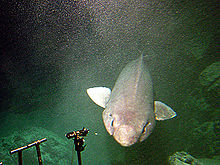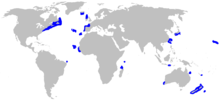Pseudotriakis
| False catshark | |
|---|---|
 |
|
| Scientific classification | |
| Kingdom: | Animalia |
| Phylum: | Chordata |
| Class: | Chondrichthyes |
| Order: | Carcharhiniformes |
| Family: | Pseudotriakidae |
| Genus: |
Pseudotriakis Brito Capelo, 1868 |
| Species: | P. microdon |
| Binomial name | |
|
Pseudotriakis microdon Brito Capelo, 1868 |
|
 |
|
| Range of the false catshark | |
| Synonyms | |
|
Pseudotriakis acrales Jordan & Snyder, 1904 |
|
Pseudotriakis acrales Jordan & Snyder, 1904
The false catshark or sofa shark (Pseudotriakis microdon) is a species of ground shark in the family Pseudotriakidae, and the sole member of its genus. It has a worldwide distribution, and has most commonly been recorded close to the bottom over continental and insular slopes, at depths of 500–1,400 m (1,600–4,600 ft). Reaching 3.0 m (9.8 ft) in length, this heavy-bodied shark can be readily identified by its elongated, keel-like first dorsal fin. It has long, narrow eyes and a large mouth filled with numerous tiny teeth. It is usually dark brown in color, though a few are light gray.
With flabby muscles and a large oily liver, the false catshark is a slow-moving predator and scavenger of a variety of fishes and invertebrates. It has a viviparous mode of reproduction, featuring an unusual form of oophagy in which the developing embryos consume ova or egg fragments released by the mother and use the yolk material to replenish their external yolk sacs for later use. This species typically gives birth to two pups at a time. The International Union for Conservation of Nature (IUCN) presently lacks sufficient data to assess the conservation status of the false catshark. While neither targeted by fisheries nor commercially valuable, it is caught incidentally by longlines and bottom trawls, and its low reproductive rate may render it susceptible to population depletion.
...
Wikipedia

